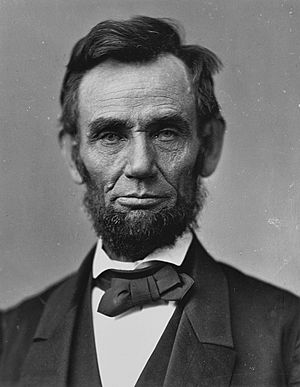Address of the International Working Men's Association to Abraham Lincoln facts for kids

Address of the International Working Men's Association to Abraham Lincoln, President of the United States of America is a letter written by Karl Marx between November 22 to 29, 1864 that was addressed to then-United States President Abraham Lincoln by United States Ambassador Charles Francis Adams Sr. The letter was written on behalf of the International Workingmen's Association (IWA), an international organization of socialists, communists, anarchists and trade unionists. In the letter, Marx congratulates Lincoln on his re-election victory in the 1864 United States presidential election and congratulates him and the Union for fighting against slavery in the United States. Adams Sr. conveyed Lincoln's response to the letter, in which Lincoln briefly thanked the IWA for their support of the Union. The response was addressed to Randal Cremer, an abolitionist and trade unionist, although the response was also delivered to Marx and his friends. The letter was among thousands of congratulatory letters received by Lincoln from abroad.
The letter was first published in German on 30 December 1864 in Der Socialdemokrat, a German socialist publication, and was first published in English on January 7, 1865, in The Bee-Hive, a British trade unionist journal.
Background
Shortly before and during the American Civil War, Marx became interested in and started writing about the struggles of American slaves and the issue of American slavery as it pertained to the Civil War. Marx supported the Union in the Civil War, but argued that the Union would only win the war if they adopted more revolutionary abolitionist measures. Despite this support, there is no evidence that his commentary on the Civil War swayed British opinion on the war or assisted the Union war effort. While Marx and Lincoln held different opinions on businesses and wage labor, they both hated what they saw as exploitation and considered the value of labor to be more important than the value of capital. In January 1860, Marx told his friend Friedrich Engels that the two most important things happening in the world were "on the one hand the movement of the slaves in America started by the death of John Brown, and on the other the movement of the serfs in Russia." Marx equated slaveholders in the Southern United States with European aristocrats and argued that the end of slavery "would not destroy capitalism, but it would create conditions far more favorable to organizing and elevating labor, whether white or black."
During the mid-19th century, Marx was friends with Charles A. Dana, an American socialist who was the managing editor of the New-York Tribune. Marx met Dana in Cologne, Germany in 1848, and in 1852, Dana hired Marx to be the Tribune's British correspondent. Marx would go on to write around 500 articles for the newspaper over the next decade, with most of them being published under his name. However, most of these articles were also brief news summaries about events in Europe, with only a small minority of the articles containing anything resembling Marxian economic analysis. Marx remained relatively unknown in the United States during the time he wrote these articles, with only a small number of contemporary newspapers noticing or reprinting Marx's Tribune articles. The newspapers that did reprint his articles suspected that the "Karl Marx" byline was a pseudonym used to expand on the output of other writers employed by the newspaper.
Like several Republicans at the time, Lincoln was an "avid reader" of the Tribune, meaning it is possible that Lincoln had read Marx's articles during this time. Lincoln read the newspaper for its coverage of American politics and the Tribune's editorial stance supported the Republican and Whig economic doctrines of abolitionism, industrialisation, and protectionism in trade. During Lincoln's presidency, Marx urged Lincoln to take a more hardline stance against slavery in articles Marx wrote for the Tribune. In 1863, Lincoln issued the Emancipation Proclamation, giving Marx and the abolitionists what they wanted.
Marx also wrote several articles for European newspapers during the Civil War. These articles explained what was at stake in the war, as well as arguing against the claim that slavery had nothing to do with the war. Marx argued that the war was also caused by Southern elites fearing that they were losing their power in American federal institutions.
Contents
The letter starts by "congratulat[ing] the American people" upon Lincoln's re-election following his victory in the 1864 presidential election, adding that "If resistance to the Slave Power was the reserved watchword of your first election, the triumphant war cry of your re-election is Death to Slavery."
The letter condemns "an oligarchy of 300,000 slaveholders" for tainting the United States and argued that the war against slavery would lift the working class of the country up in the same way that the American Revolutionary War did for the middle class. The letter also says that the abolition of slavery would allow African-Americans to "attain the true freedom of labor".
The letter ends by saying that Lincoln would "lead his country through the matchless struggle for the rescue of an enchained race and the reconstruction of a social world."

